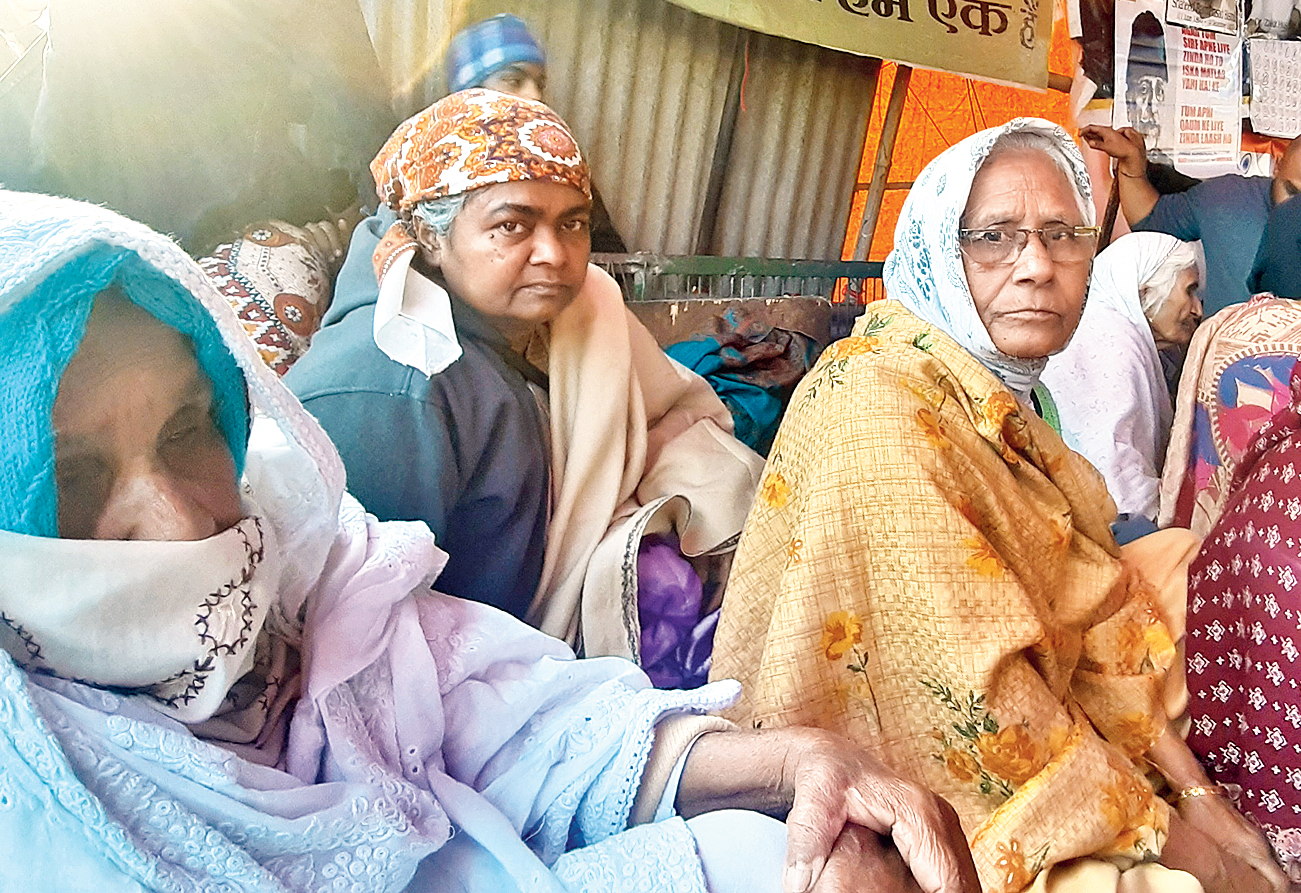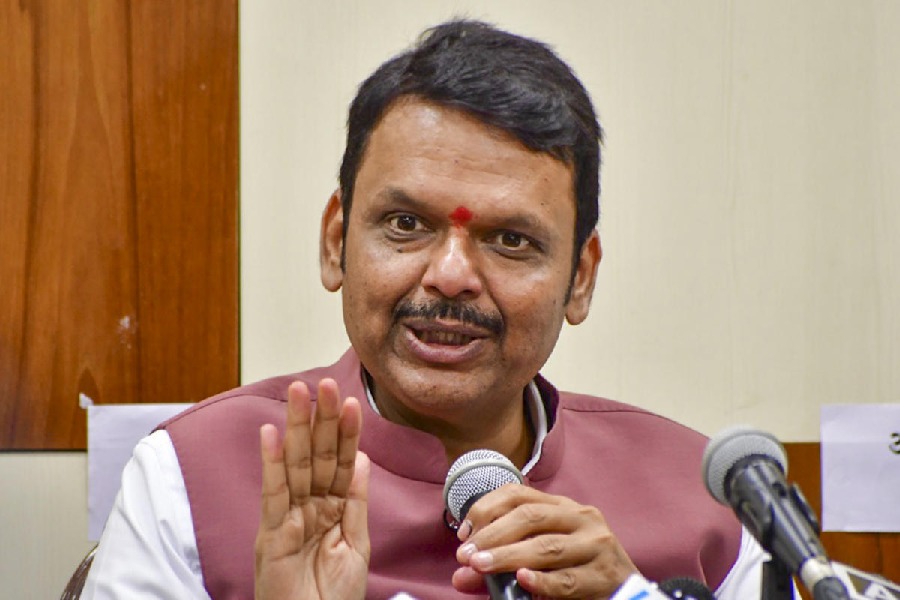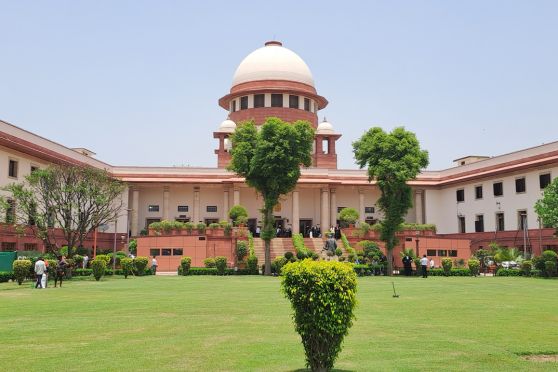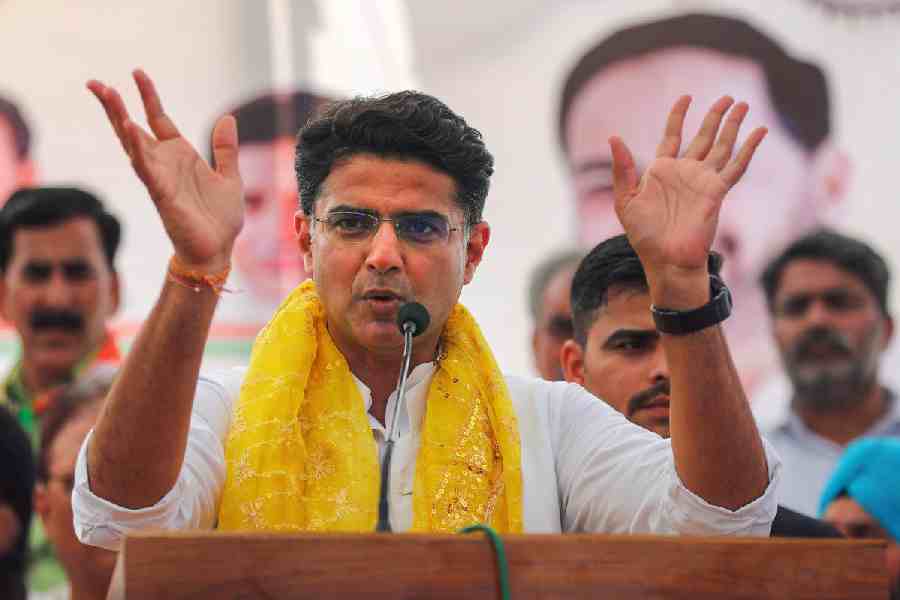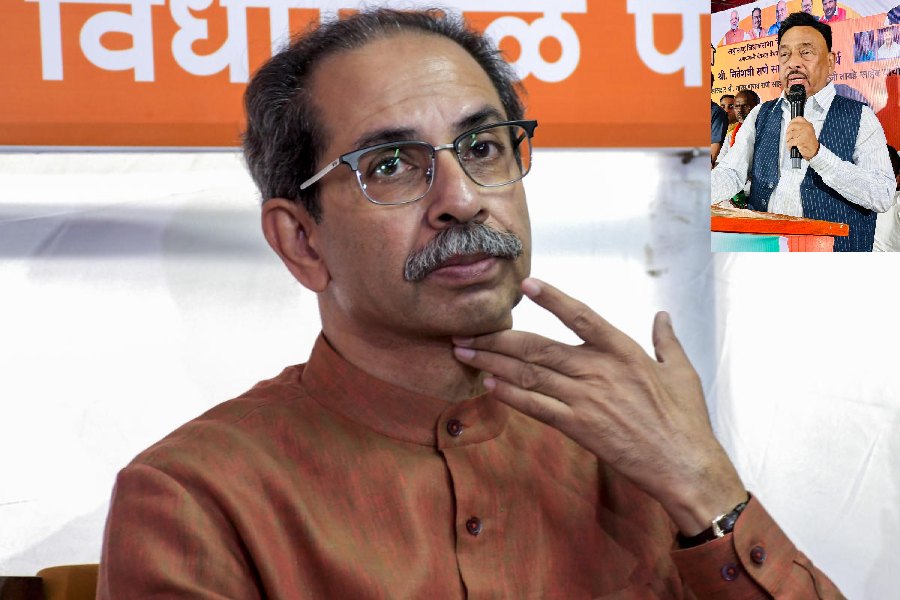At the Shaheen Bagh protest, no one has any doubt that the women are the leaders.
It’s more than four weeks that the women of Shaheen Bagh, on the west bank of the Yamuna in Delhi, have been protesting against the Citizenship (Amendment) Act.
The sit-in began on December 15 — the day police went on the rampage at the Jamia Millia Islamia university nearby in pursuit of alleged arsonists — and has braved the worst of the winter.
Politicians of all hues except saffron have been coming and going but the women have stayed on. They say they will go when the citizenship amendment goes.
This is the longest sit-in against the new citizenship act and has spurred similar initiatives in cities like Calcutta, Bhopal, Gaya, Kanpur and Nagpur.
On Sunday, a burly woman asks the men to clear the approach to the stage under a tent at Shaheen Bagh.
“There’s no place left. Women are finding it difficult. Only women and the media are allowed beyond this point. The rest of you must move back. Stand behind in support of the women,” she says sternly.
The men meekly obey.
Sonu and Ayesha watch from the periphery with their baby. The husband encourages this reporter to quote only his wife, saying: “Women are the leaders here. I’m here only in support.”
Ayesha says: “We come in shifts. Some of us come in the day, some at night. We take turns managing household chores. The government may not have listened to us so far, but won’t it have to, eventually?”
Mehrunissa, 50, has been on a hunger strike for 13 days, under a banner with images of martyred freedom fighters Ashfaqullah Khan and Ram Prasad Bismil.
“I’m not supposed to be here. The government forced me to come. The protest against the CAA was by the youth. But the police raided Jamia and thrashed even women at night,” she told The Telegraph.
“Those children had not blocked any road. My life is not more precious than theirs who have been killed in Uttar Pradesh and Assam, or the JNU girl whose head they broke.”
An allegedly ABVP-led mob that attacked students opposed to the RSS student arm at JNU on January 5 left students’ union president Aishe Ghosh and professor Sucharita Sen with severe head injuries.
Apart from the revocation of the new citizenship regime, Shaheen Bagh has space for other demands too, such as the reduction of university fees and action on the JNU violence. No representative of the Centre has met the protesters so far.
Sarvari, 75, one of the leaders of the protest and a familiar face since her appearance on NDTV, tells this newspaper: “Whether the government hears us or not, I know that God is watching. We won’t give up until they take the law back.”
She continues: “It is the people who put politicians in power, and people know how to remove them too. If we sat at home and merely watched our children at Jamia, Aligarh or JNU get beaten up, we won’t be able to forgive ourselves. I came here because I must be able to answer whether I did anything when the country was in turmoil.”
On December 15 night, Aligarh Muslim University faced a police crackdown similar to the one at Jamia.
“Woh subah kabhi toh aayegi (That dawn will come someday),” lawyer Eram Khan quotes from Sahir Ludhianvi’s film song and activist anthem.
Khan and her comrades from the CPIML New Democracy’s Pragatisheel Mahila Sangathan have been distributing fliers and booklets on the new citizenship law among those gathered.
“Just because the government doesn’t care doesn’t mean we must lose hope. The women are here because we believe that our cause is just,” Khan says.
Shaheen Bagh is a Muslim-majority pocket along one side of GD Birla Marg, which connects south Delhi to the Noida Expressway via the Okhla Barrage, and which the agitators have blocked.
Residents of nearby Hindu-dominated areas have staged protests against the road snarls caused in their neighbourhoods by traffic diversion from GD Birla Marg because of the agitation. A BJP politician has threatened counter-protests if the women aren’t evicted.
One of the organisers of the street sit-in withdrew last week to avoid a confrontation with parivar groups. Delhi High Court recently dismissed a plea to remove the protesters.
“The fundamental right of free speech is greater than the right to free movement,” a lawyer, Deepika Jain, explains.
“Laws are made to improve relations between people, and not to create turmoil. Before the (citizenship) law was passed, the government should have tried to gauge the public opinion.”
Uzma, a 20-year-old volunteer from a neighbouring slum, is distributing glasses of water. She has vermilion on her forehead, uncommon for a Muslim.
“Hindu sisters have also been coming here and helping out with the arrangements. Someone offered to put a tilak and I offered my forehead,” she says. “We Hindus and Muslims are in this together, so there is no fear of anyone now. You can see women wearing burqas and others wearing jeans.”
If there’s fear, it’s of the electronic media. Some men who seem to be suspicious of this reporter say: “Television anchors, except (NDTV’s) Ravish, have divided Hindus and Muslims enough. The police, at least, are just following orders even if they attack us. The media have bloodlust (khoon swaar hai).”
Besides journalist Ravish Kumar and the CPI’s Kanhaiya Kumar — instantly recalled by the agitators as “celebrities” who had come to support them — actors Swara Bhaskar and Zeeshan Ayyub too have visited Shaheen Bagh.
Asif Rehman, a biryani chef from Calcutta’s Beck Bagan, brought packets of biryani for the protesters a few days ago.
“I worked here for several years and kept away from politics. Even when the protests began, I felt sad about the (citizenship) legislation but did not do anything,” he says.
“Then students were beaten up in Jamia and at JNU, where that young Bengali girl (Ghosh) was almost killed. That’s why when Kanhaiya came on Thursday, I went and distributed biryani.
“My mother’s family is from Bihar, and I felt proud that Biharis like Ravish and Kanhaiya are here to support the courageous women who are leading this fight for justice.”

